Fuel price hikes will force families to choose between heating and eating this winter, government warned

People on the poverty line will be forced to choose between heating and eating this winter because of a triple whammy in the cost of living, the government is being warned.
Experts say that rising energy bills combined with the end of both furlough and the universal credit top-up risk creating a living standards crisis this autumn.
Annual gas and electricity bills are expected to soar by up to £280 after wholesale energy prices shot up. The hike led suppliers to withdraw their lowest fixed-rate offers on Thursday.
In addition, the government price cap on annual energy costs for households is due to rise next month, leaving the average dual-fuel deal at £1,277 a year. But comparison site The Energy Shop expects this to go up to £1,557.
At the same time, the furlough scheme, which was established as a way to prevent employers having to lay off workers, winds down at the end of this month.
And the £20-a-week universal credit uplift, brought in to help those receiving the benefit cope with the pandemic lockdown, is ending in early October.
National insurance is also going up by 1.25 percentage points in April.
Figures show that 1.6 million people were on furlough at the end of July, and chancellor Rishi Sunak has been warned that ending the universal credit uplift will result in the biggest ever overnight benefit cut, affecting millions of families.
Ministers argue, however, that they have spent £400bn protecting jobs and livelihoods and supporting businesses and public services during the pandemic.
The cost of gas is rising sharply due to higher demand brought about by the economic recovery after the pandemic. And a blaze in Kent, which this week knocked out a major cable bringing in electricity from France, is expected to affect supplies until March next year.
Wes Streeting, the shadow child poverty secretary, said: “My gas and electricity bill is going up by an estimated £161.67 next year. I’ll manage – but what about working families who, under the Tories, will be clobbered by a £20-a-week cut to universal credit and a 10 per cent rise in national insurance?”
Iain Porter, of the Joseph Rowntree Foundation, said: “Families on low incomes are increasingly anxious about how they are supposed to make ends meet. The prime minister says he wants to unite and level up the country, but he cannot achieve this by cutting the incomes of around 5.5 million families in and out of work.
“It’s not too late for him to heed all of the warnings and abandon this cut, or he will risk creating a living standards crisis this autumn.”
Morgan Wild, head of policy for Citizens Advice, said: “Millions of people who are still struggling with the impact of the pandemic now face a barrage of fresh challenges. The cut to universal credit, end of furlough, and hike in energy prices will squeeze family finances to the limit.
“Keeping the £20-a-week increase to universal credit is the single best way of supporting families through what will be an incredibly hard winter.”
Garry Lemon, director of policy at the Trussell Trust, said: “We know many people in need of emergency food are also living in fuel crisis, and are already caught in impossible situations where their only option is to either feed their children or heat their home.”
Former Labour leader Ed Miliband said the energy hikes showed the need to use more eco-friendly and secure energy sources.
“We need the government to reassure households and businesses that they are working with all relevant bodies to ensure secure, affordable energy supplies.
“They also need to recognise what this shows about the problems of government policy,” he said. “The best answer to these issues is to scale up and diversify our domestic energy sector, to shore up our security of supply and protect industry, including drawing on all possible zero-carbon sources of power.
“This growing crisis also reinforces the urgent need to manage demand by upgrading and insulating houses across this country.
“Instead, the Conservatives sold off the Green Investment Bank, blocked onshore wind power, cut subsidies for solar, and scrapped their flagship Green Homes grant.”
A government spokesperson said: “The furlough scheme and the uplift to universal credit were always temporary. They were designed to help people through the financial disruption of the toughest stages of the pandemic, and as we look forward and get back to normal, it’s right that our economic support reflects this.
“Universal credit continues to provide vital support for those both in and out of work, and we’re now focusing on our plan for jobs, getting people back into work, progressing and earning more.
“The Warm Home discount scheme supports over 2 million low-income and vulnerable customers each year with their energy costs.”
The government has previously said that children in households where every adult is working are five times less likely to be in poverty than those in households where nobody works, and that its jobs plan will help people to learn new skills and increase their hours or find new work.
Read More
NHS trusts ‘wrongly charging’ vulnerable migrant women for maternity care
What are the new Covid travel rules?
Beer, fizzy drinks and meat supplies threatened as CO2 shortage deepens
What is Aukus? The new defence pact between Australia, Britain and the US
Home Office admits ‘limited evidence’ that its plans will reduce Channel crossings
Give EU nationals a physical document, devolved administrations tell Home Office

 Yahoo News
Yahoo News 
